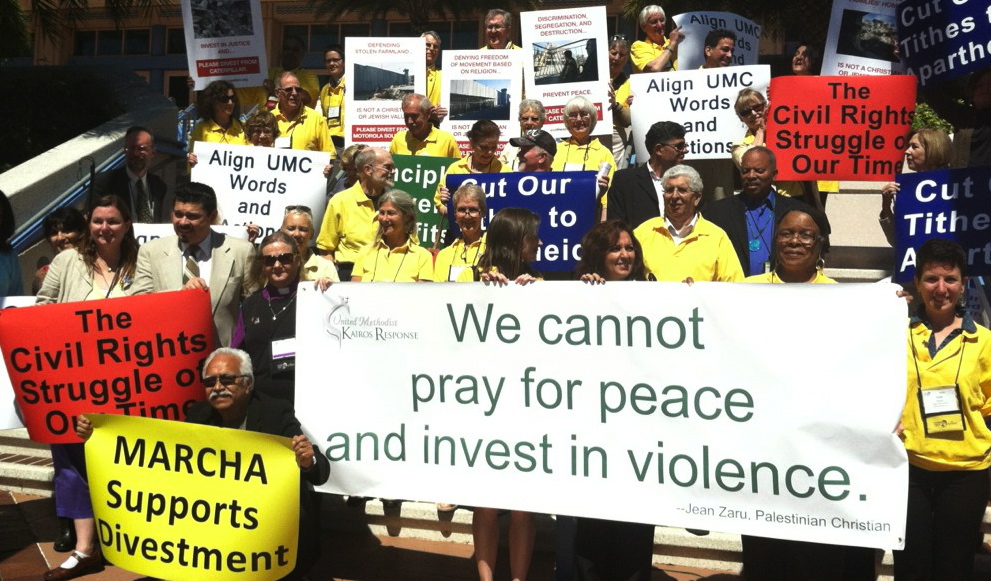Opponents to divestment have come out swinging. Fortunately, or unfortunately, they are mainly hitting air.
This summer, the Presbyterian Church (U.S.A.) General Assembly will vote on whether or not to divest from companies (Caterpillar, Hewlett-Packard, and Motorola Solutions) profiting from non-peaceful activities in Israel and Palestine.
From the beginning, the proposal has met stiff opposition, particularly from Israeli lobby groups such as the Jewish Council for Public Affairs. Such opponents often obscure the debate with accusations of anti-Semitism and anti-Israel propaganda. In reality, the recommendation to divest is based on a principled refusal to participate financially in non-peaceful activities and in the illegal occupation of Palestinian Territories, widely condemned by the international community. In fact, some significant Jewish organizations, such as the Rabbinical Council of the Jewish Voice for Peace, have expressed support for divestment.
But opponents can also be found among Presbyterians themselves. Although the 2009 Presbyterian Panel survey data indicate that a majority of Presbyterians support divestment for human rights reasons, three separate presbyteries have overtured the General Assembly to reject the use of boycott and divestment in favor of preserving dialogue and relationship with the Jewish community, recommending alternative strategies like “positive investment”.
The three overtures use words like “ethical investment”, “peacemaking”, “dialogue”, and “positive and creative course of action”—certainly, laudatory concepts. These words sound good. They point to questions about the effectiveness, strategy, and ethics of divestment. But these “positive” words do not point to a viable investment option, or to a way to end the occupation.
Strictly speaking, one could support both focused divestment and efforts to find viable investments in Palestinian enterprises, coupling the moral pressure of the former with the development assistance envisioned by the latter. But that is not the way the argument is going.
Anti-divestment overtures advocate a words-only approach that has been tried—and has failed. These overtures confuse the church’s calling to be a truthful place with being a neutral place, and attempt to equate the negotiating position of a long-subjugated people with that of a powerful and prosperous nuclear-armed state. And they ignore the call for solidarity from the Christians in Palestine and elsewhere in the Middle East.

A Stark Choice
Commissioners are faced with a stark choice: to believe the evidence of Palestinians—Christian and Muslim—who experience the daily restrictions and humiliations of the occupation, or to accept the arguments of an Israeli government that repeatedly invokes the Holocaust experience and perceptions of anti-Semitism to ward off nonviolent economic pressure. Many commissioners will have heard from representatives of the American Jewish community who make solidarity with Israel—no matter what its policies—a test of friendship and cooperation. Some may have accepted tours paid for by U.S. and Israeli organizations seeking to influence their votes. The church, however, must apply its own ethical judgment to this emotionally charged situation, based upon its own theology, values, and identity as an international community dedicated to love and justice.
The Presbyterian Church’s concern to repent of past anti-Semitism is clear and often repeated, as is our concern for the safety of Israelis as well as Palestinians. Yet it should be equally clear that criticism of the policies of hardline Israeli governments is not anti-Semitism. This is a position supported by a growing number of American Jews who are dismayed at the anti-democratic consequences of the occupation (notably Henry Seigman, the late Tony Judt). Just like the Christian and Muslim communities, the Jewish community is not monolithic. More and more courageous Jews are speaking out, some publicly supporting divestment. A recent book by Peter Beinart, a former neoconservative voice for Israel and the Iraq war, has attracted notable discussion for proposing a boycott of settlement products as a means to end the occupation and preserve democracy.

Shuhada Street, Hebron, Closed
The Use of Positive Investment as a Smokescreen
The overtures that call for “positive investment” do not provide examples or documentation on how this is to be done effectively under the restrictions of occupation. Certainly the Palestinian Authority under Salam Fayyad has done much with the aid it receives, but numerous studies confirm why foreign enterprises do not invest in the semi-isolated Palestinian cities and cannot invest with Palestinians in Area C (60 percent of the West Bank) or in Gaza due to the blockade.
In fact, many Presbyterians have worked diligently to contribute to the building up of the Palestinian economy. They have focused on the tourism industry by leading group visits to Palestine; the sale of Palestinian crafts, art work, and olive oil; and agricultural initiatives for planting olive trees and aiding in the harvest. While these acts of solidarity have supplemented some incomes, and built and cemented relationships between Presbyterians and Palestinians, they have not slowed the Occupation, or prevented the Israeli military from uprooting thousands of olive trees in the meantime.
Commenting on the three settlements “legalized” by the Israeli government in late April, 2012, The Financial Times, saw this as yet another setback to peace. Their editorial reads:
Mr. Netanyahu is unlikely to be impressed by words, or swayed by those Israelis who care what the world says. Countries that want Israel to be safe–which requires a peaceful resolution of the conflict—must look for ways to go beyond mere rhetorical condemnation.
As millions of Palestinians continue to languish under Israeli control but without a vote in Israeli affairs, the conflict will look ever more like an anti-apartheid struggle. Most Israelis know this is a battle they would be likely to lose.” (The Financial Times, April 25, 2012).
In this context, the hope of “positive investment” has been investigated over the years, but founders on the fact that capital is not the chief Palestinian need.[1] Instead, they need: secure property rights; freedom of travel, transportation, and communication; dependable water and electricity, and a range of other factors that Palestinians are prevented from having, especially in Gaza and Area C of the West Bank.
Additionally, the 1984 study The Divestment Strategy: Ethical and Institutional Context describes how divestment of securities, removing access and influence “inside” a corporation as a stockholder, may have more impact on corporate policy from the “outside.” Divestment’s effectiveness is not primarily financial but impacts the reputation and legitimacy of the behaviors focused on in ecumenical and sometimes international campaigns. Vigorous opposition to divestment by the Israeli government and its supporters indicates a real fear of being associated with the occupation and oppression of Palestinians, affirming that divestment carries an effective message that justice is needed.
 Divestment: A Positive Choice
Divestment: A Positive Choice
These “positive investment” overtures would not only restrict the church’s voice and action, but they would place the church in the same political impasse that has immobilized the U.S. government, to the detriment of U.S. interests and reputation in the region and throughout the world. What the three overtures against Mission Responsibility Through Investment (MRTI) seek to avoid is making a tough moral choice. Sometimes obeying Christ means making such a choice and standing with the weak. Divestment exemplifies choice. In this case, it is a very Presbyterian choice made “decently and in order,” after a solid process and repeated debate over eight years. It is also a very “positive” choice that affirms that God is sovereign over our economic resources, and that there should be no wall of separation between our moral and financial stewardship.
We are bound by the witness of Palestinian Christian community and the larger standards of international law to seek nonviolent diplomatic and economic measures to help bring an end to the occupation of Palestine. In the absence of a meaningful peace process, and with continuing settlements and denial of citizenship rights or independence for Palestinians, this means that our unwavering support for Israel’s right to safe, secure, and internationally accepted borders is coupled with an insistence on justice as the key to peace. Our friendship and respect for the Jewish people and the witness of Judaism are reflected in the prophetic fairness we honor in the Hebrew Scriptures and seek to apply in a difficult situation.
As we seek to stand by the dispossessed, we do not forget the humanity and aspirations of all who love Israel and Palestine. Thus we seek to engage in dialogue, honest debate, education, and engagement toward the clearest understanding of how attitudes and policies can be changed in the direction of peace with justice. May the One God help us all take responsibility for the influence and power we have and give us an awareness of the risks that all sides must make for peace to be achieved.
Presbyterians: Sign this petition in support of divestment.
See other Unbound articles on Palestine and the movement for divestment.
Check out Ecclesio, conversations on the current scene through a Gospel lens.
Notes
[1] Additional background on investment constraints: Two studies from last year provide more detail on Palestinian constraints.
“Israeli control of 60 percent of the area of the West Bank, its control of the water sources, the restrictions on the movement of people and goods within and outside the West Bank, the Israeli market’s blockage of Palestinian goods, the lengthy process of importing raw materials from abroad and of exporting – all these limitations mean the Palestinian manufacturers’ inputs are much higher than the Israelis’. Land for leasing or purchase is more expensive because of its scarcity, water and electricity cost more and a Palestinian manufacturer’s waiting time for raw materials is longer than that of his Israeli counterpart. Therefore production in the PA areas of the West Bank are more expensive by 30 to 40 percent than production in neighboring countries….
Smeirat’s findings reinforce the Palestinian national economy ministry’s view as manifested in its study of the price the occupation exacts from the Palestinian economy. According to this study (Haaretz, November 11 2011), the Israeli restrictions depicted as security restrictions are connected to the colonial nature of the Israeli occupation, and are aimed at preventing competition from the Palestinian economy.”
“The Israeli occupation is exacting a high price on the Palestinian economy, according to a report by the Palestinian Ministry of National Economy and the Applied Research Institute – Jerusalem – which puts the damage at $6.9 billion a year – what it calls a conservative estimate. The figure is about 85% of the Palestinian GDP for 2010, $8.124 billion.
The calculation includes the suspension of economic activity in the Gaza Strip because of Israel’s blockade, the prevention of income from the natural resources Israel is exploiting because of its direct control over most of the territory and the additional costs for the Palestinian expenses due to restrictions on movement, use of land and production imposed by Israel.”
See also the United Nations report: Palestine Refugees in the West Bank: socio-economic trends and long-term opportunities (April 2011).
*The Advisory Committee on Social Witness Policy of the Presbyterian Church (U.S.A.) is responsible for providing advice and counsel to the General Assembly and its representative committees on overtures, commissioner resolutions, reports, and actions before the General Assembly that recommend policy direction or action on social witness. ACSWP is also responsible for identifying facets of the church‘s social witness that enable or obstruct effective action and making recommendations for improving social witness. ACSWP has reviewed the business coming to the 220th General Assembly (2012) and provided advice and counsel on several of the items. The articles that follow are summations of that advice. A&Cs, therefore, are not policy, though they generally refer to, and recommend further, GA action. As adaptations, these articles are another step removed, and we would refer those interested to the A&C’s themselves (available at www.pc-biz.org, under Committees, number 15, posted under Comment following the business Items they address).








